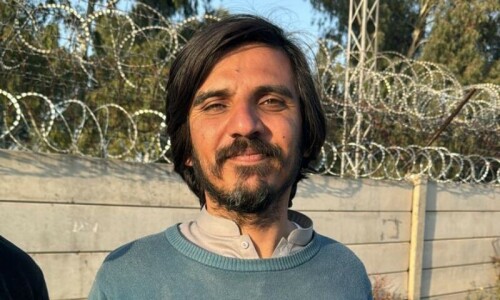ISLAMABAD: The Supreme Court on Tuesday summoned six petitioners, including a former joint secretary and a former railways police chief, who had filed a joint petition seeking regulation of media freedom, but are now trying to withdraw it after a gap of two years.
“So they took the Supreme Court for a merry-go-round,” regretted Chief Justice of Pakistan (CJP) Qazi Faez Isa, also wondering where the petitioners have now disappeared.
The CJP made these remarks while heading a three-judge bench, which had taken up the Press Association of the Supreme Court’s (PAS) challenge to the “roving inquiries” by the Federal Investigation Agency (FIA) and summons being issued by a Joint Investigation Team (JIT) on vague allegations of a so-called explicit and malicious campaign against the superior judiciary and its judges.
The bench also comprised Justice Musarrat Hilali and Justice Naeem Akhtar Afghan.
Police do not seem to want to solve Matiullah Jan’s abduction case, CJ Faez Isa observes
Referring to an application seeking to withdraw their 2022 joint petition, which had been filed by Advocate Haider Waheed on behalf of ex-IGP Syed Ibne Hussain from Lahore, former joint secretary Hassan Mehmood and Advocate Kosain Faisal from Islamabad, Advocate Mohammad Asif of the Chakwal Bar, Wings College Principal Prof Abrar Ahmed and senior vice chairman of International Human Rights Movement Raja Sher Bilal from Chakwal, the CJP questioned what purpose, which the petitioners wanted to achieve, has been served that they intended to withdraw the joint petition.
The CJP observed that the application claimed the petition had served its purpose in spirit, therefore, it was being withdrawn. To the contrary, Justice Isa remarked, the very opposite of what they had sought to achieve might have been partially served, which relates to press freedom.
The bench observed that when the case was called, the petitioners, their counsel and Advocate-on-Record (AoR) were neither present nor any intimation was received from them by the court.
Attorney General for Pakistan Mansoor Usman Awan disagreed with the applicant’s argument that the federal government was looking into the matter.
The CJP said the real question was about the origins of the joint petition.
Representing PAS, senior counsel Salahuddin Ahmed argued that in public importance litigation, the petitioners did not enjoy personal discretion to withdraw their petition.
There were several instances where such petitions were filed and then the parties tried to reach settlements but the courts did not allow the withdrawal of such petitions, the counsel said.
When CJP asked if the counsel had reached any private settlement with the petitioners seeking to constraint media freedom, the counsel said the PAS opposed the grounds and the prayers made in the joint petition as they sought to limit the freedom of speech. His clients did not have much resources, nor any idea about the petitioners, he said, requesting the court to summon them.
The court observed that since none of the six petitioners were in attendance and the notice of withdrawal was served by one AoR to another, there was nothing to show they were acting on the instructions of the petitioners. In this situation, it would be appropriate to issue notices to all six petitioners with the direction to be in attendance personally on the next date of hearing, the court order stated.
When the PAS counsel also drew the attention of the SC towards a fact-finding inquiry by the Rawalpindi-Islamabad Union of Journalist (RIUJ) in the matter of harassment of journalist Matiullah Jan, the CJP noted that the impression they gathered was that the police did not want to solve it, since even the availability of a video recording did not inspire confidence.
The AGP, however, said he would be following the matter with the interior ministry, as action was being taken on the basis of a Punjab forensic science lab report.
The court also allowed PFUJ to become party in the matter, as they were supporting the PAS petition.
Meanwhile, the AGP filed a report stating that the police had recorded the statement of journalist Shahid Maitla, who had conducted an interview of former army chief Qamar Javed Bajwa, where Mr Maitla said he had carried out an interview, but had no knowledge about the attempt on the life of journalist Absar Alam and harassment of Asad Toor.
During the proceedings, the CJP also regretted selective reporting, sometimes completely fabricated news and a lack of self-accountability in the media. Since it was not the court’s job to issue clarifications all the time, he mused, the apex court might have to run its own YouTube channel.
Published in Dawn, April 3rd, 2024














































Dear visitor, the comments section is undergoing an overhaul and will return soon.